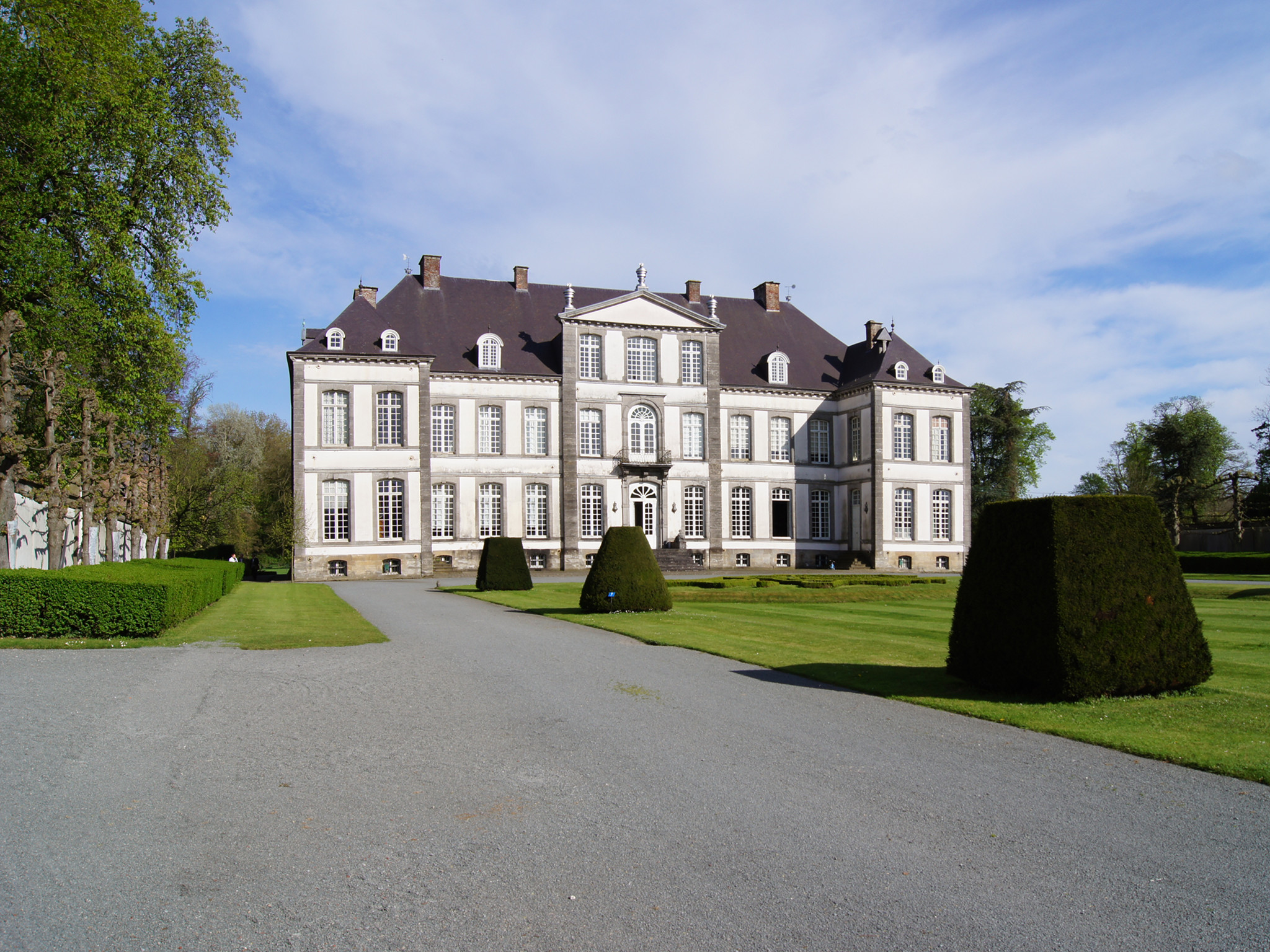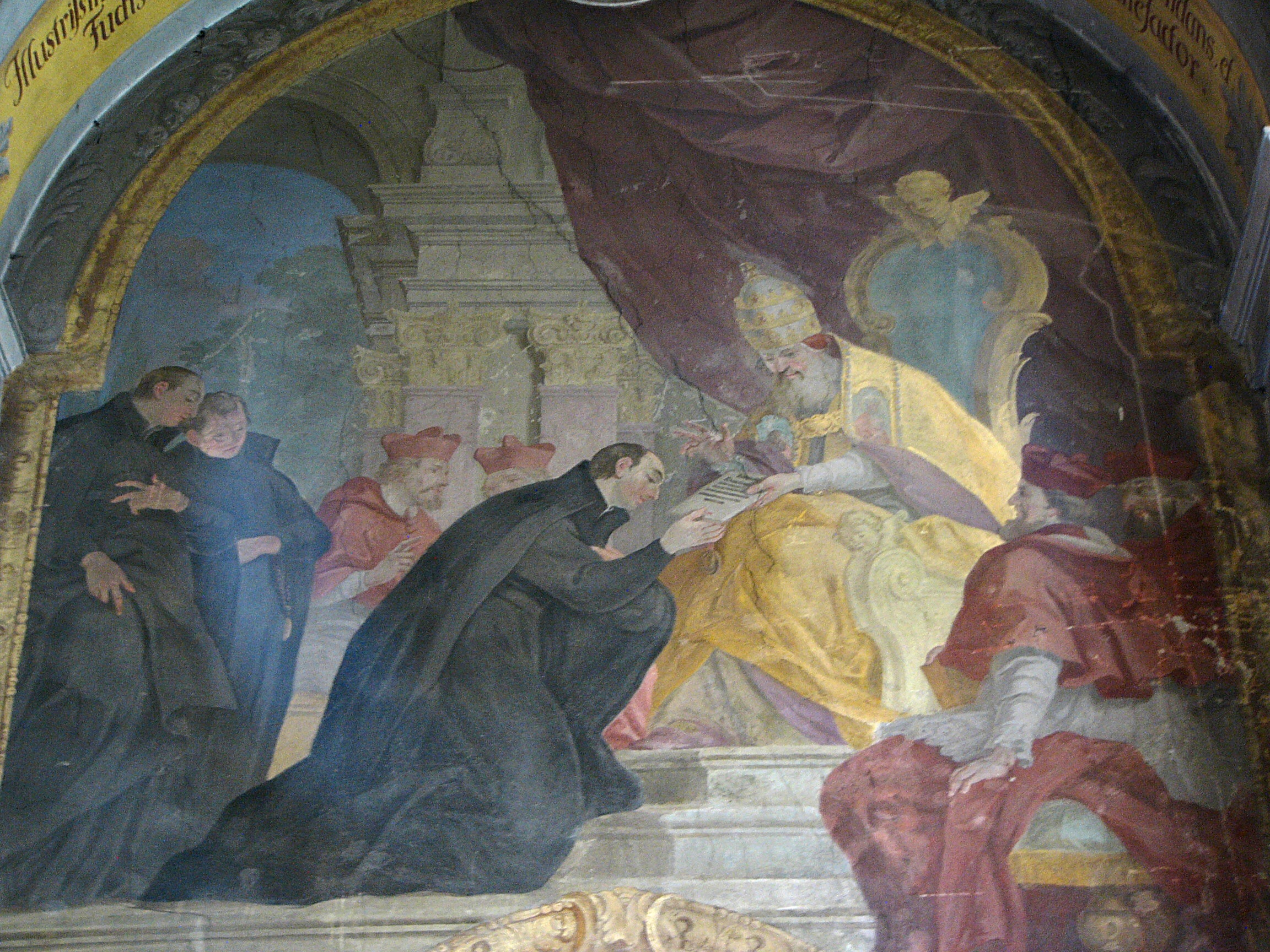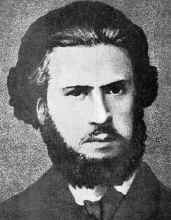|
Anatole De Bengy
Anatole de Bengy (born 19 September 1824, executed at the court of the Cité Vincennes, Rue Haxo, Paris 26 May 1871) was one of the five Jesuit martyrs of the Paris Commune, along with Pierre Olivaint. Biography De Bengy spent nine years in residence at the Jesuit College of Brugelette, and in 1834 entered the Society of Jesus. During the Crimean War he served as chaplain to the French soldiery and thereafter until 1870 devoted his life to college work. When the Franco-Prussian War broke out, he again sought and obtained the post of chaplain. He rendered service to the poor, sick and wounded during the siege of Paris. After the war he retired to the school of Sainte-Geneviève to resume his work as professor. At midnight, 3 April, a battalion or National Guards surrounded the school and placed all the Jesuit inmates under arrest as hostages of the Paris Commune The Paris Commune (french: Commune de Paris, ) was a revolutionary government that seized power in Paris, the c ... [...More Info...] [...Related Items...] OR: [Wikipedia] [Google] [Baidu] |
Vincennes
Vincennes (, ) is a commune in the Val-de-Marne department in the eastern suburbs of Paris, France. It is located from the centre of Paris. It is next to but does not include the Château de Vincennes and Bois de Vincennes, which are attached to the city of Paris. History The Marquis de Sade was imprisoned in Vincennes fortress in 1777, where he remained until February 1784 although he escaped for a little over a month in 1778. Thereafter Vincennes fortress was closed and de Sade transferred to the Bastille. In 1821, the noted French poet, Alfred de Vigny, wrote his poem, "La Prison," which details the last days of the Man in the Iron Mask at Vincennes. The ministers of Charles X were imprisoned at the fortress of Vincennes after the July Revolution. A test was conducted in 1849 on Claude-Étienne Minié's invention the Minié ball which would prove successful and years later be adopted by the French army. On the morning of 15 October 1917, famous femme fatale Mata Hari ... [...More Info...] [...Related Items...] OR: [Wikipedia] [Google] [Baidu] |
Paris
Paris () is the capital and most populous city of France, with an estimated population of 2,165,423 residents in 2019 in an area of more than 105 km² (41 sq mi), making it the 30th most densely populated city in the world in 2020. Since the 17th century, Paris has been one of the world's major centres of finance, diplomacy, commerce, fashion, gastronomy, and science. For its leading role in the arts and sciences, as well as its very early system of street lighting, in the 19th century it became known as "the City of Light". Like London, prior to the Second World War, it was also sometimes called the capital of the world. The City of Paris is the centre of the Île-de-France region, or Paris Region, with an estimated population of 12,262,544 in 2019, or about 19% of the population of France, making the region France's primate city. The Paris Region had a GDP of €739 billion ($743 billion) in 2019, which is the highest in Europe. According to the Economist Intelli ... [...More Info...] [...Related Items...] OR: [Wikipedia] [Google] [Baidu] |
Jesuit
, image = Ihs-logo.svg , image_size = 175px , caption = ChristogramOfficial seal of the Jesuits , abbreviation = SJ , nickname = Jesuits , formation = , founders = , founding_location = , type = Order of clerics regular of pontifical right (for men) , headquarters = Generalate:Borgo S. Spirito 4, 00195 Roma-Prati, Italy , coords = , region_served = Worldwide , num_members = 14,839 members (includes 10,721 priests) as of 2020 , leader_title = Motto , leader_name = la, Ad Majorem Dei GloriamEnglish: ''For the Greater Glory of God'' , leader_title2 = Superior General , leader_name2 = Fr. Arturo Sosa, SJ , leader_title3 = Patron saints , leader_name3 = , leader_title4 = Ministry , leader_name4 = Missionary, educational, literary works , main_organ = La Civiltà Cattolica ... [...More Info...] [...Related Items...] OR: [Wikipedia] [Google] [Baidu] |
Martyrs Of The Paris Commune
The Paris Commune (french: Commune de Paris, ) was a revolutionary government that seized power in Paris, the capital of France, from 18 March to 28 May 1871. During the Franco-Prussian War of 1870–71, the French National Guard had defended Paris, and working-class radicalism grew among its soldiers. Following the establishment of the Third Republic in September 1870 (under French chief executive Adolphe Thiers from February 1871) and the complete defeat of the French Army by the Germans by March 1871, soldiers of the National Guard seized control of the city on March 18. They killed two French army generals and refused to accept the authority of the Third Republic, instead attempting to establish an independent government. The Commune governed Paris for two months, establishing policies that tended toward a progressive, anti-religious system of social democracy, including the separation of church and state, self-policing, the remission of rent, the abolition of chil ... [...More Info...] [...Related Items...] OR: [Wikipedia] [Google] [Baidu] |
Pierre Olivaint
Pierre Olivaint (1816–1871) was a French Jesuit who was killed by the Paris Commune. Early life Pierre Olivaint was born in 1816 of parents who were not religious. At twenty, he left home, and the College of Charlemagne, where he had studied, imbued him with the doctrines of Voltaire. He wrote at the time, "I desire, if by any possibility I should become a priest, to be a missionary, and if I am a missionary to be a martyr". In 1836, he entered the École Normale. Led at first by Philippe Buchez's neo-Catholicism and then won by the sermons of Lacordaire, he made his profession of faith to Gustave Delacroix de Ravignan (1837). At the École Normale, he formed a Catholic group. The Conferences of St. Vincent de Paul attracted the élite of the schools, and Olivaint with twelve of his companions established them in the parish of Saint Ménard. In 1836, Olivaint heard that Lacordaire was going to restore the Dominican Order in France. Several of his friends had already decided ... [...More Info...] [...Related Items...] OR: [Wikipedia] [Google] [Baidu] |
Brugelette
Brugelette (; pcd, Brujlete; wa, Brudjlete) is a municipality of Wallonia located in the province of Hainaut, Belgium. On January 1, 2006, Brugelette had a total population of 3,284. The total area is which gives a population density of . The municipality consists of the following districts: Attre, Brugelette, Cambron-Casteau, Gages, and Mévergnies-lez-Lens. See also *Attre Castle Attre Castle (''Château d'Attre'') is a former castle, now a country house or château, in Attre in the municipality of Brugelette, province of Hainaut, Wallonia, Belgium. History The present château at Attre was built in the middle of the 18 ... * Pairi Daiza (zoo and botanical garden) References External links * Official web site Municipalities of Hainaut (province) {{Hainaut-geo-stub ... [...More Info...] [...Related Items...] OR: [Wikipedia] [Google] [Baidu] |
Society Of Jesus
, image = Ihs-logo.svg , image_size = 175px , caption = ChristogramOfficial seal of the Jesuits , abbreviation = SJ , nickname = Jesuits , formation = , founders = , founding_location = , type = Order of clerics regular of pontifical right (for men) , headquarters = Generalate:Borgo S. Spirito 4, 00195 Roma-Prati, Italy , coords = , region_served = Worldwide , num_members = 14,839 members (includes 10,721 priests) as of 2020 , leader_title = Motto , leader_name = la, Ad Majorem Dei GloriamEnglish: ''For the Greater Glory of God'' , leader_title2 = Superior General , leader_name2 = Fr. Arturo Sosa, SJ , leader_title3 = Patron saints , leader_name3 = , leader_title4 = Ministry , leader_name4 = Missionary, educational, literary works , main_organ = La Civiltà Cattoli ... [...More Info...] [...Related Items...] OR: [Wikipedia] [Google] [Baidu] |
Crimean War
The Crimean War, , was fought from October 1853 to February 1856 between Russia and an ultimately victorious alliance of the Ottoman Empire, France, the United Kingdom and Piedmont-Sardinia. Geopolitical causes of the war included the decline of the Ottoman Empire, the expansion of the Russian Empire in the preceding Russo-Turkish Wars, and the British and French preference to preserve the Ottoman Empire to maintain the balance of power in the Concert of Europe. The flashpoint was a disagreement over the rights of Christian minorities in Palestine, then part of the Ottoman Empire, with the French promoting the rights of Roman Catholics, and Russia promoting those of the Eastern Orthodox Church. The churches worked out their differences with the Ottomans and came to an agreement, but both the French Emperor Napoleon III and the Russian Tsar Nicholas I refused to back down. Nicholas issued an ultimatum that demanded the Orthodox subjects of the Ottoman Empire be placed ... [...More Info...] [...Related Items...] OR: [Wikipedia] [Google] [Baidu] |
Siege Of Paris (1870–1871)
The siege of Paris took place from 19 September 1870 to 28 January 1871 and ended in the capture of the city by forces of the various states of the North German Confederation, led by the Kingdom of Prussia. The siege was the culmination of the Franco-Prussian War, which saw the Second French Empire attempt to reassert its dominance over continental Europe by declaring war on the North German Confederation. The Prussian-dominated North German Confederation had recently emerged victorious in the Austro-Prussian War of 1866, which led to the questioning of France’s status as the dominant power of continental Europe. With a declaration of war by the French parliament on 16 July 1870, Imperial France soon faced a series of defeats at German hands over the following months, leading to the Battle of Sedan, which, on 2 September 1870, saw a decisive defeat of French forces and the capture of the French emperor, Napoleon III. With the capture of Napoleon III, the government of the Seco ... [...More Info...] [...Related Items...] OR: [Wikipedia] [Google] [Baidu] |
Lycée Privé Sainte-Geneviève
The Lycée Sainte-Geneviève is a private ''lycée'', located in Versailles and providing preparatory classes for ''grandes écoles''. It was founded by the Jesuits in Paris in April 1854. It is often nicknamed ''Ginette'' and sometimes ''BJ'', standing for ''Boite à Jèzes'' (Box of Jesuits). Academics Sainte-Geneviève is famous for having among the highest success rates at the entrance exams of the most selective French grandes écoles in the fields of engineering (École Polytechnique, Mines ParisTech, École des Ponts ParisTech, and CentraleSupélec) and commerce (HEC Paris, ESSEC Business School and ESCP Business School). Ginette provides PC/PC*, MP/MP*, PT/PT*, PSI*, ECS and BCPST classes. Notable alumni Military * Hubert Lyautey (1854–1934), Marshal of France * Jean de Lattre de Tassigny (1889–1952), Marshal of France * Antoine Béthouart (1889–1982), Compagnon de la Libération * Henry de Bournazel (1898–1933) * Honoré d'Estienne d'Orves (1901–1941), C ... [...More Info...] [...Related Items...] OR: [Wikipedia] [Google] [Baidu] |
Paris Commune
The Paris Commune (french: Commune de Paris, ) was a revolutionary government that seized power in Paris, the capital of France, from 18 March to 28 May 1871. During the Franco-Prussian War of 1870–71, the French National Guard had defended Paris, and working-class radicalism grew among its soldiers. Following the establishment of the Third Republic in September 1870 (under French chief executive Adolphe Thiers from February 1871) and the complete defeat of the French Army by the Germans by March 1871, soldiers of the National Guard seized control of the city on March 18. They killed two French army generals and refused to accept the authority of the Third Republic, instead attempting to establish an independent government. The Commune governed Paris for two months, establishing policies that tended toward a progressive, anti-religious system of social democracy, including the separation of church and state, self-policing, the remission of rent, the abolition of child l ... [...More Info...] [...Related Items...] OR: [Wikipedia] [Google] [Baidu] |





